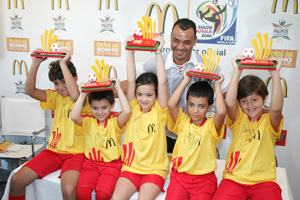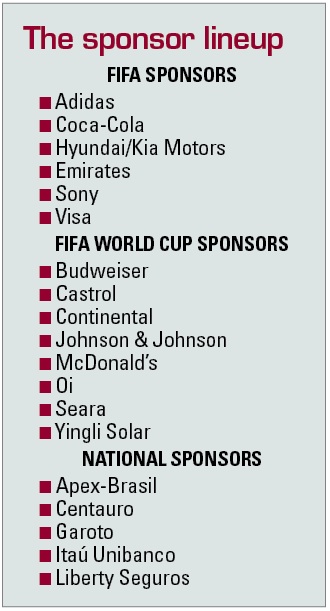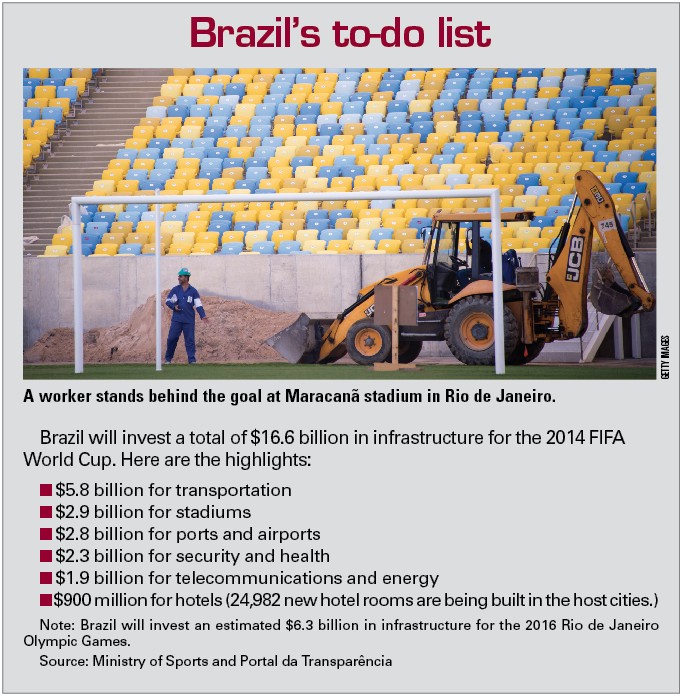The 2014 FIFA World Cup in Brazil is being viewed by sponsorship executives in a different, broader light.
“In our communication with clients, I can tell you that we see the 2014 World Cup as the first mainstream FIFA World Cup platform,” said Simon Wardle, the executive vice president and chief strategy officer for Octagon Worldwide, which is managing activation and hospitality programs at the tournament for Budweiser and Johnson & Johnson, among other FIFA and U.S. Soccer Federation sponsors.
 |
While Coca-Cola is still finalizing its plans, the company has been visible in Brazil, including on this display featuring the World Cup mascot outside a store in Porto Alegre.
Photo by: Getty Images |
“Historically, our clients and our company have used the World Cup as a Hispanic platform, but no longer,” Wardle said. “We’ve reached a critical mass — with the viewership data from the 2010 World Cup in South Africa, the increased accessibility of the sport, the growth of the sport in the U.S., NBC and Fox’s investment in soccer — where it is now viewed as a legitimate mainstream activation platform with the grandest of stages.”
Longtime World Cup marketers and first-timers agree that the stakes next year in Brazil, where the tournament will take place from June 12 to July 13, will be high.
“The event is a year away, and we’ve already been working on it for a year,” said Eelco van der Noll, head of global sports and entertainment for Anheuser-Busch InBev. “The challenge for every sponsor in Brazil is: How do we use the World Cup to amplify our brand? Off the pitch, we want to be the most recognizable, active, meaningful sponsor for everyone who is the legal drinking age and above. We want to enhance the experience of the consumers beyond the viewing of the games.”
Van der Noll will manage activations at his sixth men’s World Cup. At the event in 1994 in the U.S., he was with Canon. In 1998 (France) and 2002 (Japan and South Korea), he was with MasterCard. After spending the last World Cup as the head of marketing for FIFA, he will lead Anheuser-Busch’s activation for both its Budweiser brand and Brazilian beer, Brahma. His advice to colleagues comes after years of lessons learned.
“The World Cup is a huge opportunity for any sponsor, but it’s also a huge thing to deal with,” said van der Noll. “The biggest takeaway that most sponsors get from their first World Cup is not to do too much. Keep it simple, customizable, and make your message clear. Don’t spread yourself too thin with a hundred tie-ins that take a lot of time and resources but in the end do not pay off. Less is more.”
While both van der Noll and A-B InBev have been involved in World Cups for a long time, Liberty Seguros — the Brazilian subsidiary of Boston-based Liberty Mutual insurance company — is sponsoring its first FIFA World Cup.
“It may be a year away, but we are already feeling some butterflies in our stomachs,” said Adriana Gomes, the
 |
McDonald’s will again feature a program that allows children to walk onto the field with players for each match. The children shown above were selected to walk with the Brazilian team during the 2010 World Cup in South Africa.
Photo by: AP Image |
marketing director of Liberty Seguros, which is designated as one of five FIFA national supporters. “We’re looking to build brand awareness, and World Cup is the biggest platform you could possibly have. But we also see this as a benchmark for future sports sponsorship for Liberty Seguros. If the event is as successful as we expect it to be, it could lead to more sports sponsorship for our company.”
Marketers were hesitant to share specific activation plans a year before the World Cup in Brazil — “You’re always worried about competitors looking over your shoulders,” van der Noll said — but some were willing to give a peek.
For the third straight World Cup, McDonald’s is bringing back its player escort program, where children walk onto the field holding hands with players before every match. McDonald’s global sports marketing executive Brian Goldstein estimates that more than 1,400 children will be player escorts in Brazil. Registration for the contest will begin this year at the more than 34,000 McDonald’s restaurants in 118 countries. Goldstein said that the company’s markets are in the process of determining their participation at the World Cup and will identify a selection criteria specific to each country.
“The program is all about making dreams come true and is part of our commitment to children, encouraging them to participate in sports and inspire creativity while giving them an unforgettable experience,” Goldstein said.
Brazil will mark McDonald’s sixth World Cup as a sponsor. Among its other activations will be McDonald’s Ultimate FIFA World Cup Fan contest, where entrants compete online to prove they are the most passionate fans of their national teams. Winners receive a trip for two for the semifinals and final match. It also will sponsor McDonald’s FIFA Fantasy Football, which the company said attracted more than 1 million players during the 2010 World Cup in South Africa.
Arnab Roy, director of football marketing at Coca-Cola, said the company’s global activation for World Cup will launch in phases later this year.
“Football is easily the No. 1 global passion and the FIFA World Cup is the biggest sporting platform,” Roy said. “It has been a proven asset within our system to drive brand love and brand value.”
Itaú Unibanco, a Brazilian bank and FIFA national supporter, will host a contest in which two fans can win the opportunity to attend the post-match news conferences after each match. At Unibanco’s activation sites at each World Cup stadium, fans will receive bank and World Cup-branded merchandise. One fan, judged to be the most creatively dressed, will be selected by the bank’s marketing team to attend the news conference with a guest.
“The idea is to encourage fans to enter the game looking like a normal person, and use the merchandise with a creative flair so they leave the game looking like a World Cup fanatic,” said Andréa Pinotti Cordeiro, marketing director of Itaú Unibanco.
Like many of the properties sponsoring the World Cup, Itaú Unibanco is using the tournament’s highly prized tickets as rewards for customers and employees. Itaú Unibanco has more than 600 pairs of tickets to give away.
FIFA World Cup sponsors are entitled to a commercial restricted area near the turnstiles at each of Brazil’s 12 World Cup stadiums. In the case of A-B InBev brand Budweiser, one of eight companies designated as FIFA World Cup sponsors, the areas will be used to expand service to consumers who will already have access to drink Budweiser and Brahma at Aramark’s concession stands.
“We’ll have beer gardens at each stadium — with the all-important Wi-Fi,” van der Noll said. “Fans can come to our space and vote for the Budweiser Man of the Match.”
While finding hotel rooms has been a challenge for many sponsors, Anheuser-Busch is taking over the Pestana Rio Atlantica hotel in Rio de Janeiro, adjacent to Copacabana beach. The hotel will serve as A-B’s headquarters for guests and for executives coordinating activities around the World Cup.
Some companies will use the services of famous soccer players at their activations. For example, the former Brazilian star Cafu, a member of World Cup championship teams in 1994 and 2002, will make appearances on behalf of Liberty Seguros.
Yingli Solar, a FIFA World Cup sponsor, won a competitive bid to build 1,500 solar panels adjacent to Estádio do Maracanã, the host stadium for the World Cup Final and other matches. Yingli will activate with a social media campaign on Instagram, Facebook and Twitter called “All Under One Sun.” At Yingli’s commercial restricted area, fans will be able to charge their mobile devices at the company’s solar stations.
Asked what would make the 2014 World Cup a successful platform for Yingli Solar, marketing communications head Helena Kimball said, “Proof that we built awareness — coverage in the media, an increase of Yingli Solar searches on major engines, website visits, sales increases. We will monitor everything. We’re very optimistic because South America represents a real budding market for solar energy.”
Although preliminary plans may be in place, sponsors of the U.S. men’s national team will have to wait as late as September to see if the club qualifies for the World Cup.
Tracy Drelich, the associate manager of sponsorships and promotions for BP Lubricants, the parent company of Castrol Motor Oil, would not discuss Castrol’s plans for activation around the U.S. team in Brazil. (Castrol is also a FIFA World Cup sponsor.)
However, Castrol has been activating around the U.S. team during its exhibition matches and World Cup qualifiers this year and many of its programs could be utilized next year in Brazil. The Castrol Correspondent contest gives fans 18 and older an opportunity to explain in brief videos posted to Facebook why they should be chosen to report on the U.S. squad. If the U.S. qualifies for the World Cup, the winning correspondent — chosen by Facebook fans and Castrol executives — will attend the team’s first three matches at the World Cup. Castrol is also the sponsor of a “Road to Brazil” web series of videos on the U.S. team.
Octagon’s Wardle said that the U.S. team’s increased presence on ESPN and press coverage has made the team highly marketable.
“There is a lot of American interest in the U.S. team,” Wardle said. “Marketers have seen that they are drawing in the casual sports fan. Americans want to get behind the red, white and blue.”
FIFA sponsors like Castrol have an edge in preparations for next year’s World Cup because they are currently activating at the 2013 FIFA Confederations Cup, an eight-country tournament that began in Brazil over the weekend and continues until June 30.
“Confederations Cup is a pilot test for everything — activation, fan engagement, ticket distribution,” said Alexandre Leitão, president of Octagon Brazil.
The Confederations Cup also signals the start of the countdown to the main event. The buildup in Brazil is palpable.
“In Brazil, the World Cup has already begun,” Leitão said. “In the business space, plans have been made, ideas are being tested, projects are being finalized. I’m confident that this is going to be an amazing World Cup for fans and for businesses.”







